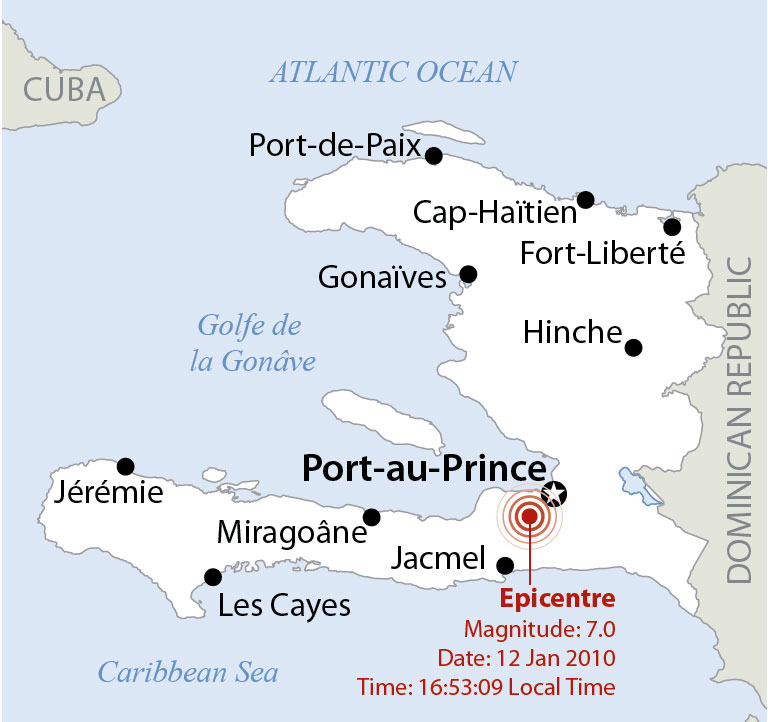Haitians face shelter crisis

More than three weeks after the devastating earthquake that hit Haiti, the government and aid agencies are ramping up relief operations as needs become clearer.
Yet shelter for the hundreds of thousands of survivors remains a desperate race against the clock as the rainy and hurricane seasons loom.
The aid operation in Haiti has been complicated and frustratingly slow but is making significant progress, particularly in getting food to quake survivors, the top United Nations relief official said in Geneva on Tuesday.
“We still have a significant way to go before we reach everyone with the aid they need,” John Holmes, humanitarian coordinator at the UN Office for the Coordination Humanitarian Affairs (OCHA), told the media.
The World Food Programme and its partners should complete two-week food distributions for two million people in Haiti over the next ten days.
Water and health is also becoming less of a problem, said Holmes, with the focus now on post-operative care, mobile clinics, more medical supplies and vaccination campaigns.
But he warned shelter remained a “major issue” and said a transitory solution needed to be found before the rains and hurricanes arrive in May.
Homeless
The 7.0-magnitude earthquake that hit the capital Port-au-Prince on January 12 is estimated to have killed up to 200,000 people and left around 1.1 million homeless. Around 75 per cent of the buildings in the city were destroyed.
Some 600,000 people are now living in makeshift camps in the capital, while over 482,000 have moved north and westwards, with 90 per cent staying with friends and relatives.
Agencies want to avoid creating large camps, “which tend to become permanent over time”, said Holmes. In the capital the idea was to allow people to stay near the ruins of their homes and close to their jobs, rather than moving them out.
Hurricane-resistant shelter, possibly large numbers of prefabricated wood buildings, would be needed later, he said.
“This is a major challenge. We don’t have a magic solution. Hurricanes have caused major disasters in Haiti before,” Holmes said. “It will probably be a year or two before we can get people back in proper construction.”
Strain on infrastructure
Joe Lowry, communication officer for the International Federation of Red Cross and Red Crescent Societies based in Haiti, agreed that shelter was a major priority in the capital.
“Integrating quake survivors into rural communities avoids camps and camp management problems, but increasing some rural populations by up to 40 per cent puts a massive strain on creaky infrastructure, healthcare and sanitation,” he told swissinfo.ch.
The influx of survivors from the capital has also driven up the prices of basic products in rural areas, such as rice and sugar, says the UN.
“But it’s also hard to know where people will settle,” said Lowry. “Some people with homes that have not been damaged are not living in them as they are scared of possible aftershocks.”
Beat von Däniken, chief of staff at the Humanitarian Aid Unit at the Swiss Agency for Development and Cooperation, applauded the efforts to create shelters.
“This early-recovery stage is a difficult part of the game. The situation in rural areas is also very different from urban,” he said.
Security and coordination
Holmes also dismissed criticism of operational delays and coordination problems.
“The delays we’ve seen in Haiti are all to do with logistics, the sheer difficulty of making things happen in a context like Haiti,” he said.
Von Däniken agreed that inter-agency coordination had “improved considerably”.
Holmes characterised the security situation in the capital as calm, apart from “isolated incidents of looting or attacks on convoys of food”.
The UN police and military force in Haiti and the United States military are ensuring security at food distribution points and escorting convoys but the US troops would not stay for more than a few months, he said.
But Lowry said the Red Cross had experienced no trouble and questioned the UN approach.
“Distributions have the potential to turn violent when you corral people behind barbed wire and point machine guns at them – you’re asking for a reaction,” he said.
“Haiti has a reputation as a dangerous, strange place,” said Lowry. “But from talking to lots of different people the message is that they all just want to get on with their lives and that they love their country so much.”
Simon Bradley, swissinfo.ch
Port-au-Prince airport is small, damaged and congested and the city’s port is non-operational.
There is a shortage of warehouse space, and a lack of vehicles and fuel shortages are hindering the transport of relief supplies.
Security escorts are required to deliver relief goods, affected populations are scattered in hundreds of sites around the capital Port-au-Prince and nearby cities.
Roads and bridges are damaged, some still at risk of landslides.
Logistical bottlenecks are developing because some shipments include goods that are not in the UN humanitarian appeal.
Switzerland has around 50 people on the Haiti mission. An important focus apart from medical care is taking care of those without shelter.
The team of experts includes 12 doctors working at the university hospital. Water specialists are also active trying to restore the water supply and setting up 12 drinking-water distribution centres in poorer districts in the capital.
The government’s humanitarian aid unit has sent three freight aircraft to the earthquake zone with more than 170 tons of aid goods – tents, tarpaulins, medicines, medical materials and non-food items – being distributed.
More than SFr36.4 million ($34.5 million) has been pledged by the Swiss public to Swiss Solidarity, a fundraising charity led by the Swiss Broadcasting Corporation, swissinfo.ch’s parent company.
Foreign Minister Micheline Calmy-Rey paid a brief visit to Port-au-Prince in Haiti on Sunday, where she visited aid workers and met President René Préval.
On her Facebook page, she wrote about “homes and districts flattened, the huge queues of people waiting for food aid and lives that carry on”.
“What a lesson of courage,” said Calmy-Rey. “I was also impressed by the energy of the staff from the Swiss Humanitarian Aid Unit, despite their tiredness and difficult conditions.”


In compliance with the JTI standards
More: SWI swissinfo.ch certified by the Journalism Trust Initiative












You can find an overview of ongoing debates with our journalists here . Please join us!
If you want to start a conversation about a topic raised in this article or want to report factual errors, email us at english@swissinfo.ch.